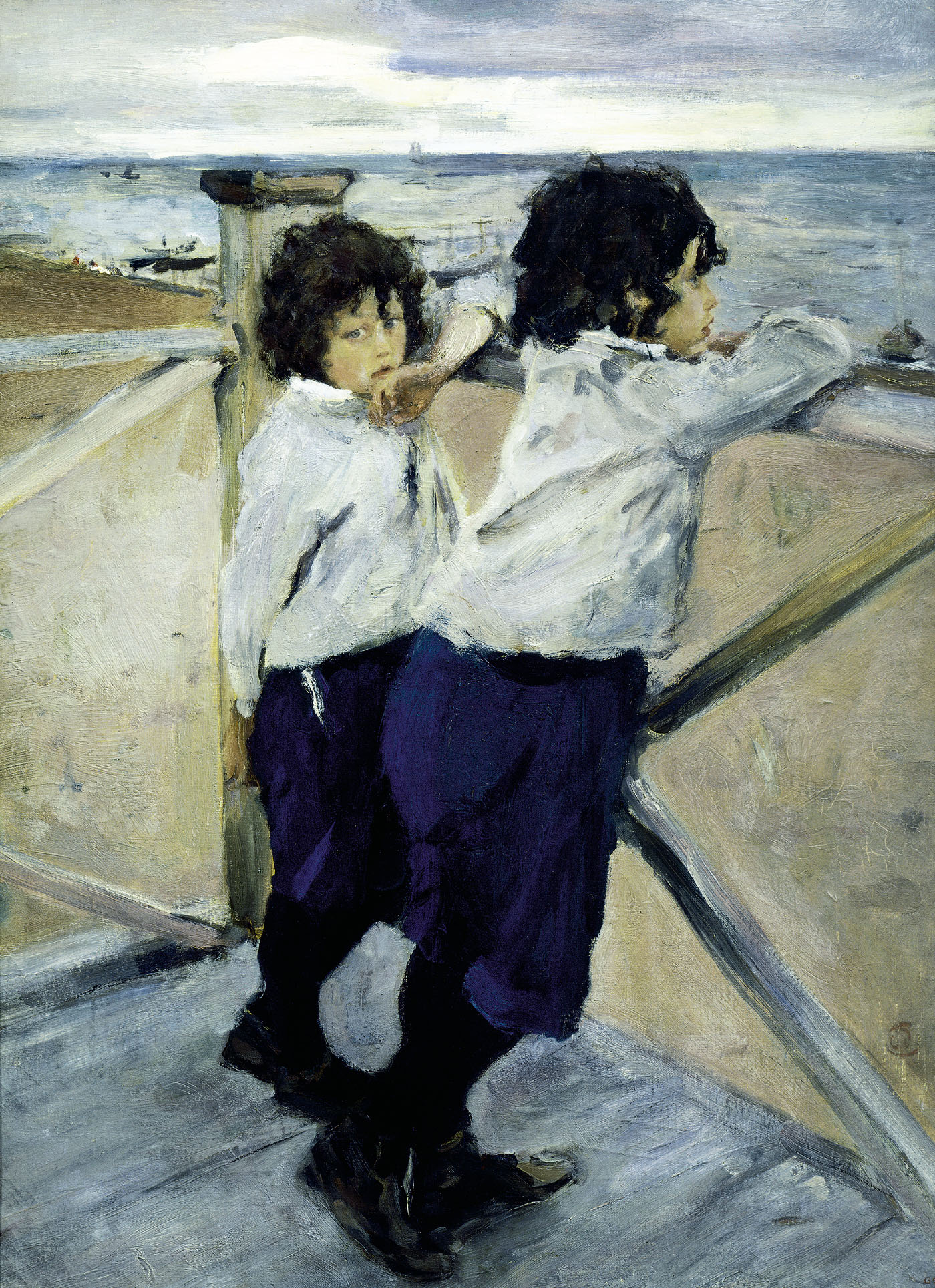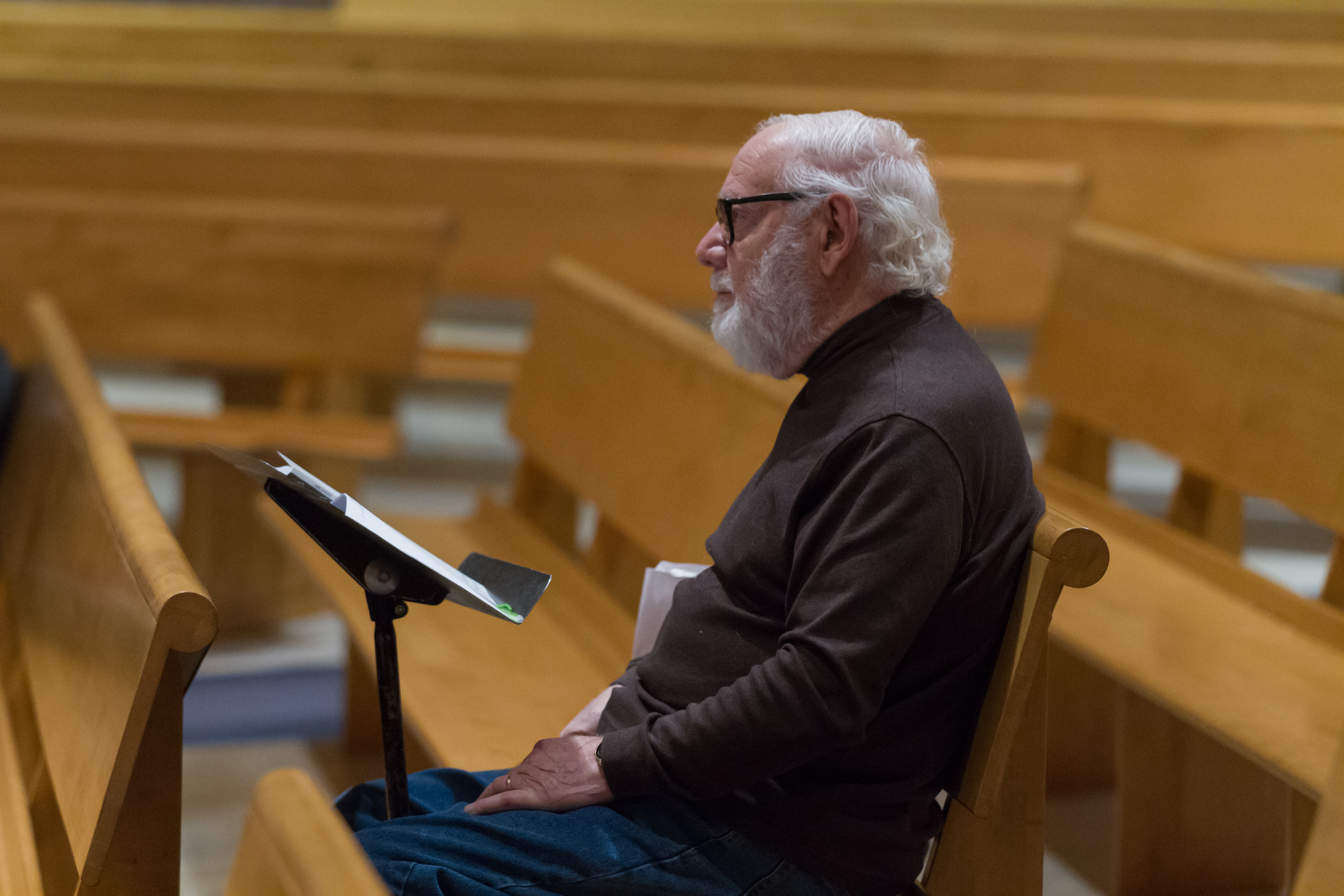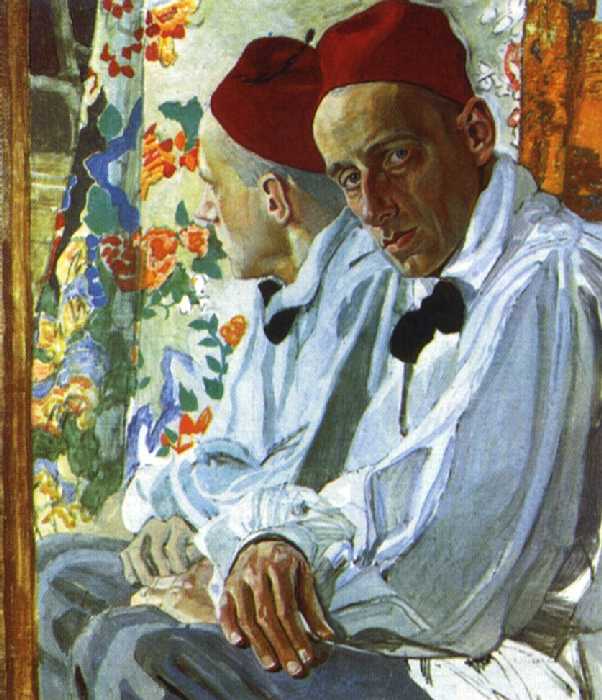|
L'Ours (play)
''The Bear: A Joke in One Act'', or ''The Boor'' (, 1888), is a one-act comedic play written by Russian author Anton Chekhov. The play was originally dedicated to Nikolai Nikolaevich Solovtsov, Chekhov's boyhood friend and director/actor who first played the character Smirnov. Characters * Elena Ivanovna Popova, a little landowning widow with dimples on her cheeks *Grigory Stepanovitch Smirnov, a middle-aged landowner *Luka, Popova's aged footman caring, loyal, obedient and not so intelligent Plot The play takes place in the drawing room of Elena Ivanovna Popova's estate exactly seven months after her husband's death. Since her husband died, Popova has locked herself in the house in mourning. Her footman, Luka, begins the play by begging Popova to stop mourning and step outside the estate. She ignores him, saying that she made a promise to her husband to remain forever faithful to his memory. Their conversation is interrupted when Grigory Stepanovitch Smirnov arrives and wishes to ... [...More Info...] [...Related Items...] OR: [Wikipedia] [Google] [Baidu] |
Valentin Serov
Valentin Alexandrovich Serov (; – 5 December 1911) was a Russian painter and one of the premier portrait artists of his era. Life and work Youth and education Serov was born in Saint Petersburg, son of the Russian composer and music critic Alexander Serov and his wife and former student Valentina Serova, also a composer in her own right. Raised in a highly artistic milieu he was encouraged to pursue his talents by his parents and in his childhood he studied in Paris and Moscow under Ilya Repin and in the St. Petersburg Academy of Arts (1880–1885) under Pavel Chistyakov. Serov's early creativity was sparked by the realistic art of Repin and strict pedagogical system of Chistyakov. Further influences on Serov were the old master paintings he viewed in the museums of Russia and Western Europe, friendships with Mikhail Vrubel and (later) Konstantin Korovin, and the creative atmosphere of the Abramtsevo Colony, to which he was closely connected. Early works The ... [...More Info...] [...Related Items...] OR: [Wikipedia] [Google] [Baidu] |
Yakov Polonsky
Yakov Petrovich Polonsky (; ) was a leading Pushkinist poet who wrote poems faithful to the traditions of Russian Romantic poetry during the heyday of realistic prose. Of noble birth, Polonsky attended the Moscow University, where he befriended Apollon Grigoryev and Afanasy Fet. Three young and promising poets wrote pleasing and elegant poems, emulating Pushkin and Mikhail Lermontov. He graduated from the university in 1844, publishing his first collection of poems the same year. Polonsky's early poetry is generally regarded as his finest; one of his first published poems was even copied by Nikolai Gogol into his notebook. Unlike some other Russian poets, Polonsky did not belong to an affluent family. In order to provide for his relatives, he joined the office of Prince Vorontsov, first at Odessa and then (1846–51) at Tiflis. The spectacular nature of the Black Sea coast strengthened his predilection for Romanticism. Polonsky turned his attention to the Caucasian subjects an ... [...More Info...] [...Related Items...] OR: [Wikipedia] [Google] [Baidu] |
The Boor (opera)
''The Boor'' is an opera in one act composed by Ulysses Kay to a libretto based on Anton Chekhov's comic play, '' The Bear'' (also known as ''The Boor''). Kay wrote the libretto himself basing it on an English translation of the play by the composer Vladimir Ussachevsky. The opera was commissioned by the Koussevitsky Foundation of the Library of Congress and is dedicated to the memory of Natalie and Serge Koussevitzky. It premiered on 2 April 1968 in concert version at the University of Kentucky in Lexington, Kentucky. Roles *Elena Ivanovna Popova, ''a landowning young widow'' (soprano)Roles and voice types sourced from Griffel (2012) p. 64 *Grigory Stepanovitch Smirnov, ''a middle-aged landowner'' (baritone) *Luka, ''Elena's elderly footman'' (tenor A tenor is a type of male singing voice whose vocal range lies between the countertenor and baritone voice types. It is the highest male chest voice type. Composers typically write music for this voice in the range from the ... [...More Info...] [...Related Items...] OR: [Wikipedia] [Google] [Baidu] |
Ulysses Kay
Ulysses Simpson Kay (January 7, 1917 in Tucson, Arizona – May 20, 1995 in Englewood, New Jersey) was an American composer. His music is mostly neoclassical in style. Life and career Kay, the nephew of the classic jazz musician King Oliver, studied piano, violin and saxophone.De Lerma, Dominique-Rene"African Heritage Symphonic Series" Liner note essay. Cedille Records CDR061. He attended the University of Arizona, where he was encouraged by the African-American composer William Grant Still. He went for graduate work to the Eastman School of Music in Rochester, New York, and there worked under Howard Hanson and Bernard Rogers. Ulysses Kay met the eminent neoclassical composer Paul Hindemith in the summer of 1941 at the Berkshire Music Center and followed Hindemith to Yale for a formative year of study from 1941 to 1942. After a stint as a musician in the United States Navy during World War II, Kay studied at Columbia University under Otto Luening with the assistance of a gran ... [...More Info...] [...Related Items...] OR: [Wikipedia] [Google] [Baidu] |
The Bear (opera)
''The Bear'' is the second of the two operas by William Walton, described in publication as an "Extravaganza in One Act". The libretto was written by Paul Dehn and Walton,Holden, p. 1050 based on the play of the same title by Anton Chekhov (which is also sometimes translated into English as ''The Boor''). Walton received a commission from the Koussevitzsky Foundation in 1958, and he dedicated the opera "to the memory of Serge and Natalie Koussevitzky". He began composing in 1965 when the Aldeburgh Festival in England requested an opera from him. ''The Bear'' was first performed at the Jubilee Hall, Aldeburgh on 3 June 1967. The opera is regarded as having "enjoyed more success and popularity than its larger-scale predecessor, ''Troilus and Cressida'' .....because its witty parodies are in the manner of alton's 1922'' Facade''" and the librettists' ability "to emulate Chekhov's caricatures of the three main characters" are also successful. Synopsis :Place: The drawing room ... [...More Info...] [...Related Items...] OR: [Wikipedia] [Google] [Baidu] |
William Walton
Sir William Turner Walton (29 March 19028 March 1983) was an English composer. During a sixty-year career, he wrote music in several classical genres and styles, from film scores to opera. His best-known works include ''Façade'', the cantata '' Belshazzar's Feast'', the Viola Concerto, the First Symphony, and the British coronation marches ''Crown Imperial'' and '' Orb and Sceptre''. Born in Oldham, Lancashire, the son of a musician, Walton was a chorister and then an undergraduate at Christ Church, Oxford. On leaving the university, he was taken up by the literary Sitwell siblings, who provided him with a home and a cultural education. His earliest work of note was a collaboration with Edith Sitwell, ''Façade'', which at first brought him notoriety as a modernist, but later became a popular ballet score. In middle age, Walton left England and set up home with his young wife Susana on the Italian island of Ischia. By this time, he had ceased to be regarded as a mode ... [...More Info...] [...Related Items...] OR: [Wikipedia] [Google] [Baidu] |
Dominick Argento
Dominick Argento (October 27, 1927 – February 20, 2019) was an American composer known for his lyric operatic and choral music. Among his best known pieces are the operas '' Postcard from Morocco'', '' Miss Havisham's Fire'', ''The Masque of Angels'', and '' The Aspern Papers.'' He also is known for the song cycles ''Six Elizabethan Songs'' and '' From the Diary of Virginia Woolf''; the latter earned him the Pulitzer Prize for Music in 1975. In a predominantly tonal context, his music freely combines tonality, atonality and a lyrical use of twelve-tone writing. None of Argento's music approaches the experimental, stringent ''avant-garde'' fashions of the post-World War II era.Saya, Virginia. "Dominick Argento," ''Grove Music Online'', ed. L. Macy. (Accessed 15 December 2006). As a student in the 1950s, Argento divided his time between the United States and Italy, and his music is greatly influenced by both his instructors in the United States and his personal affection for Ita ... [...More Info...] [...Related Items...] OR: [Wikipedia] [Google] [Baidu] |
Royalties
A royalty payment is a payment made by one party to another that owns a particular asset, for the right to ongoing use of that asset. Royalties are typically agreed upon as a percentage of gross or net revenues derived from the use of an asset or a fixed price per unit sold of an item of such, but there are also other modes and metrics of compensation.Guidelines for Evaluation of Transfer of Technology Agreements, United Nations, New York, 1979 A royalty interest is the right to collect a stream of future royalty payments. A license agreement defines the terms under which a resource or property are licensed by one party ( party means the periphery behind it) to another, either without restriction or subject to a limitation on term, business or geographic territory, type of product, etc. License agreements can be regulated, particularly where a government is the resource owner, or they can be private contracts that follow a general structure. However, certain types of franchise ag ... [...More Info...] [...Related Items...] OR: [Wikipedia] [Google] [Baidu] |
Korsh Theatre
The Russian Drama Korsh Theatre (), commonly known as the Korsh Theatre, was a theatre which functioned in Moscow, Imperial Russia from 1882 until 1917. It was named after its founder, entrepreneur Fyodor Korsh. After the 1917 Revolution it carried on for several years under different guises, known variously as the Union of Artists, The Third RSFSR Theatre, The Comedy Theatre (Former Korsh), and finally the Moscow Drama Theatre, before being finally shut down in 1933. The building, situated on Petrovsky Lane, is now occupied by the Theatre of Nations. History The theatre was co-founded by the entrepreneur Fyodor Korsh and the actors Modest Pisarev and Vasily Andreyev-Burlak on the basis of the Anna Brenko's Pushkin Theatre, which had gone bankrupt in 1881. In 1883 Korsh (who had received substantial financial help from the industrialist and patron of arts Alexander Bakhrushin) became its sole owner. Its earliest productions included '' Revizor'' by Nikolai Gogol, '' The Fore ... [...More Info...] [...Related Items...] OR: [Wikipedia] [Google] [Baidu] |
Fainting
Syncope , commonly known as fainting or passing out, is a loss of consciousness and muscle strength characterized by a fast onset, short duration, and spontaneous recovery. It is caused by a decrease in blood flow to the brain, typically from low blood pressure. There are sometimes symptoms before the loss of consciousness such as lightheadedness, sweating, pale skin, blurred vision, nausea, vomiting, or feeling warm. Syncope may also be associated with a short episode of muscle twitching. Psychiatric causes can also be determined when a patient experiences fear, anxiety, or panic; particularly before a stressful event, usually medical in nature. When consciousness and muscle strength are not completely lost, it is called presyncope. It is recommended that presyncope be treated the same as syncope. Causes range from non-serious to potentially fatal. There are three broad categories of causes: heart or blood vessel related; reflex, also known as neurally mediated; and ... [...More Info...] [...Related Items...] OR: [Wikipedia] [Google] [Baidu] |
Vsevolod Meyerhold
Vsevolod Emilyevich Meyerhold (; born ; 2 February 1940) was a Russian and Soviet theatre director, actor and theatrical producer. His provocative experiments dealing with physical being and symbolism in an unconventional theatre setting made him one of the seminal forces in modern international theatre. During the Great Purge, Meyerhold was arrested in June 1939. He was tortured, his wife was murdered, and he was executed on 2 February 1940. Life and work Early life Vsevolod Meyerhold was born Karl Kasimir Theodor Meyerhold in Penza on to Russian-German wine manufacturer Friedrich Emil Meyerhold and his Baltic German wife, Alvina Danilovna (). He was the youngest of eight children.Pitches (2003, pg. 4) His father came from an old noble family Meyerhold von Ritterholm. The elder Meyerhold emigrated to Russia in the 1850s. After completing school in 1895, Meyerhold studied law at Moscow University but never completed his degree. He was torn between studying theatr ... [...More Info...] [...Related Items...] OR: [Wikipedia] [Google] [Baidu] |
Theatre Director
A theatre director or stage director is a professional in the theatre field who oversees and orchestrates the mounting of a theatre production such as a play, opera, dance, drama, musical theatre performance, etc. by unifying various endeavors and aspects of production. The director's function is to ensure the quality and completeness of theatre production and to lead the members of the creative team into realizing their artistic vision for it. The director thereby collaborates with a team of creative individuals and other staff to coordinate research and work on all the aspects of the production which includes the Technical and the Performance aspects. The technical aspects include: stagecraft, costume design, theatrical properties (props), lighting design, set design, and sound design for the production. The performance aspects include: acting, dance, orchestra, chants, and stage combat. If the production is a new piece of writing or a (new) translation of a play, the director ... [...More Info...] [...Related Items...] OR: [Wikipedia] [Google] [Baidu] |





